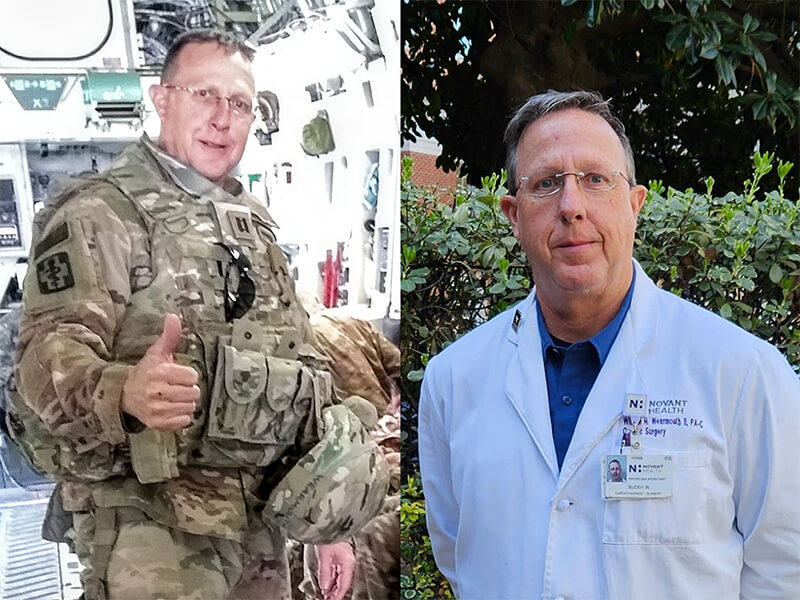When William “Buddy” Wearmouth, PA-C ’86, sat down in front of a United States Army recruiter, the recruiter’s confused look spoke volumes.
At 52 years old, Wearmouth admitted that his interest in joining the military was coming later than the typical recruit’s. “I should have done my service earlier, but I missed the boat in the 70s,” Wearmouth recalled saying.
The recruiter’s confusion and skepticism disappeared when he learned Wearmouth was a PA. “You’re medical. I can take you up to the age of 55 because you’re a PA,” the recruiter said.
That marked the beginning of eight years of military service that took Wearmouth around the world and allowed him to touch countless lives. He provided medical service to the Border Patrol in El Paso, Texas. He was deployed to the Middle East to care for soldiers in Kuwait and Iraq. He even served on the front lines of the COVID-19 pandemic in New York City.
“It was a huge honor to be able to join and wear the uniform,” Wearmouth said, emphasizing the privilege of serving alongside younger soldiers while contributing his experience and knowledge.
Flexibility and Rewards
Buddy’s time in the Army represents just one chapter in his career. Shortly after graduating from the Wake Forest PA Studies program in 1986, Wearmouth started working in cardiothoracic (CT) surgery in Charlotte. His connection with a surgeon and occasional lecturer at Wake Forest paved the way for him to help expand opportunities for PAs in the region.
“He had been coaching me about how PAs were involved at institutions like the Mayo Clinic and the Texas Heart Institution,” Wearmouth recalled. “Then one day he called to tell me about a program he was starting in Charlotte. He wanted me to introduce PAs to the CT surgery world there.”
Throughout his career, Wearmouth made other stops to satiate his desire for variety. He even moonlighted in urgent care, leveraging the flexibility of his PA license. Today, having stepped back from his CT surgery position, Wearmouth has joined the Locum Network, which will take him around the country on short-term stints to provide care where it’s needed.
Wearmouth highlights the flexibility of the PA profession as one of its greatest strengths. “Having a PA license opens a lot of doors,” he noted. Unlike most other medical professionals, PAs can transition between specialties without additional certifications.
This flexibility allowed Wearmouth to explore different medical roles while maintaining a financially rewarding career. “The demand for PAs has always exceeded the supply. Being a PA has provided for my family very well,” he said.

A Foundation Built at Wake Forest
Wearmouth credits his time at Wake Forest’s PA program as a cornerstone of his success. The curriculum’s group-based, independent learning model mirrored the collaborative and problem-solving nature of the profession itself.
“It was during the 1980s, when the PA profession was still relatively young,” Wearmouth said, remembering the program’s emphasis on critical thinking and responsibility. He also looked back fondly on the camaraderie with his classmates, who brought a variety of backgrounds and experiences. “It was a good group to be around,” he added.
For Buddy, the PA profession has been a pathway to a fulfilling and dynamic career, enabling him to serve others, explore new opportunities, and make a lasting impact in healthcare.
As he approaches the end of his career, Wearmouth encourages young people to consider becoming PAs. The profession offers unmatched flexibility, job security, and the privilege of caring for others.
“Every time you have a new patient, there is an instant relationship that is based on trust,” Wearmouth said. “It’s very rewarding.”
